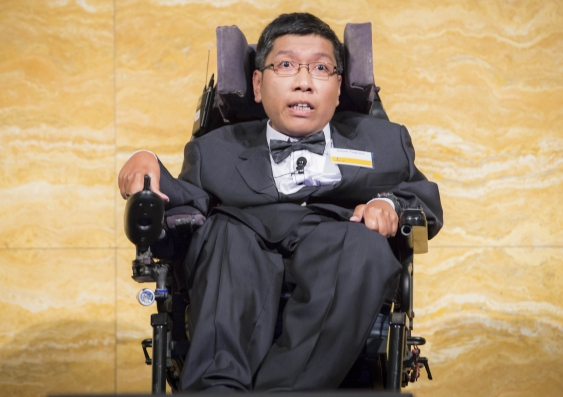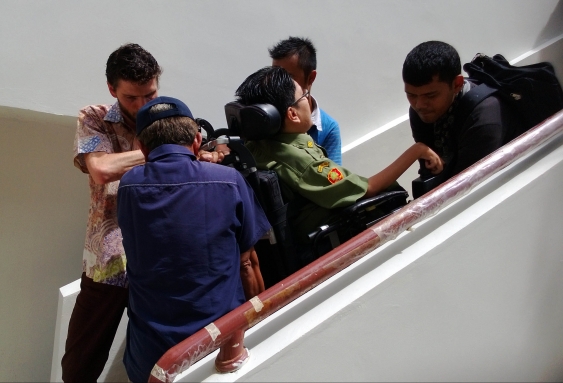An optimistic outlook for disability inclusion
UNSW PhD candidate Antoni Tsaputra outlines how disability-inclusive budgeting can ensure full and effective participation of people with disability.
UNSW PhD candidate Antoni Tsaputra outlines how disability-inclusive budgeting can ensure full and effective participation of people with disability.

For his presentation at this year’s 3-Minute Thesis competition, UNSW PhD candidate Antoni Tsaputra explained the benefits that disability-inclusive budgeting can have for people with disability in Indonesia.
Ahead of International Day of People with Disability on 3 December, he says it is an approach that also has practical applications for UNSW.
Tsaputra is an international student completing his doctorate in the Faculty of Arts & Social Sciences, exploring disability-inclusive budgeting and its focus on four key planning phases.
“It’s centred on governments and institutions actively involving people with disability in the analysis, design, implementation and monitoring of all development programs at both a national and local level,” he says.
“This approach is applicable at UNSW because it can ensure full and effective participation of people with disability. Our voice needs to be heard and accommodated, and this should be done from inside the system.”
Governments and other bodies in Australia already practice disability-inclusive budgeting in certain capacities, but progress has varied in other parts of the world.
Diagnosed with a form of muscular dystrophy at a young age and using a wheelchair to get around, Tsaputra has faced significant barriers to access and inclusion, including his country’s regulatory system and the assumptions of decision makers.

Many multistory buildings in Indonesia still don’t have lifts. Photo: supplied
“When the government builds new infrastructure, they fail to consider the needs of people with disability,” he says.
“Indonesia does have laws relating to building standards, but these are not binding. Government officials often assume that providing accessibility will be expensive. If Universal Design principles are followed, though, it doesn’t have to be.”
Developed by a group of US-based architects, designers and engineers in the late 1990s, the seven principles of Universal Design enshrine access and ease of use for all. The principles cover:
Access to education is another common issue for people with disability, especially in developing countries. Tsaputra says that his own determination, and support from his family, have helped him to achieve things many other people living with disability in Indonesia may not have been able to.
“Both my parents value education highly and so I’m lucky to have had great support from them,” he says.
“When my brother went to the [local] public school, I insisted that I should go there too. Some people at the time said that I should go to a special development school, but why should I go there? I want a normal education like everyone else.”
Tsaputra says raising awareness of the issues faced by people with disability, and the importance of disability-inclusive budgeting, requires effort from many areas.
Disability issues should not just be viewed from social welfare or health perspectives. These are issues affecting all human beings at some stage of life.
“The main responsibility lies with the media, but people with disability also need to actively educate others through their organisations, and be willing to talk to government,” he says.
“Disability issues should not just be viewed from social welfare or health perspectives. These are issues affecting all human beings at some stage of life.”
Universities and other institutions also play a key role in generating positive outcomes for people with disability.
“UNSW’s establishment of the Disability Innovation Institute is a great example of disability-inclusive budgeting being put into practice because the director will be a person with disability and its aim is to engage people with disability in research and communication,” Tsaputra says.
“It’s a very positive step forward for the University.”
UNSW’s soon-to-be-launched Disability Inclusion Action Plan will provide a framework for all areas of the University to take steps to ensure equitable access and inclusion for all staff and students.
The theme for International Day of People with Disability 2017, “Transformation towards a sustainable and resilient society for all”, is particularly pertinent to Tsaputra.
“When people with disability are able to fully contribute in society, it allows them to build resilience,” he says.